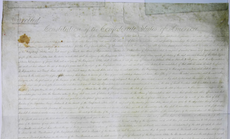William S. Barry
William S. Barry | |
|---|---|
 | |
| Born | December 10, 1821 |
| Died | January 29, 1868 (aged 46) |
| Nationality | American |
| Alma mater | Yale College |
| Occupation | Politician |
| Years active | 1861 to 1862/ 1853 to 1855 |
William S. Barry (born William Taylor Sullivan Barry; December 10, 1821 – January 29, 1868) was an American politician who served as a Deputy from Mississippi to the Provisional Congress of the Confederate States from 1861 to 1862. He was also a U.S. Representative from 1853 to 1855, representing the state of Mississippi.
Biography
[edit]Born in Columbus, Mississippi, William S. Barry graduated from Yale College in 1841 and was initiated into Skull and Bones Society in his last year.[1][2]: 67 He was admitted to the bar in 1844 and then practiced law in Columbus, Ohio. One of his many interests was horticulture. He served as member of the Mississippi House of Representatives from 1849 to 1851. He was elected as a Democrat to the Thirty-third Congress (March 4, 1853 – March 3, 1855). He was the Speaker of the Mississippi House of Representatives from 1856 to 1857.[3] He served as president of the State secession convention in 1861. He served as member of the Provisional Congress of the Confederate States. During the American Civil War he enlisted in the Confederate States Army and raised the 35th Mississippi Infantry Regiment, at times acting as brigade commander. He was captured and paroled at the Vicksburg. He broke parole and commanded his regiment, and at times Sears's Brigade, during the Atlanta Campaign. He was seriously wounded at the Battle of Allatoona on October 5, 1864. He was captured in the attack on Fort Blakeley and held prisoner at New Orleans until May 1, 1865. After his release, Barry resumed the practice of law in Columbus, where he died on January 29, 1868. He is interred in the Odd Fellows Cemetery.[4]
Personal life and family
[edit]Barry was the son of Columbus residents Richard Barry and Mary (Sullivan) Barry.[5] He was married to Sarah Fearn.[5] Their son, William Shelby Barry (born 1857), represented Leflore County in the Mississippi House of Representatives from 1888 to 1890 and from 1912 to 1920.[5]
References
[edit]- ^ Obituary Record of Graduates of Yale College Deceased During the Academical Year Ending in July, 1869. New Haven, Connecticut: Yale University. 1869. p. 320.
- ^ Fraternity, Psi Upsilon (1917). The twelfth general catalogue of the Psi Upsilon Fraternity. The fraternity. Retrieved March 24, 2011.
- ^ Rowland, Dunbar (1907). Mississippi: Comprising Sketches of Towns, Events, Institutions, and Persons, Arranged in Cyclopedic Form. Southern Historical Publishing Association. p. 84.
- ^ Allardice, Bruce S. More Generals in Gray. Baton Rouge: Louisiana State University Press, 1995. ISBN 0-8071-3148-2 (pbk.)
- ^ a b c Rowland, Dunbar (1917). The Official and Statistical Register of the State of Mississippi. Department of Archives and History. pp. 886–887.
External links
[edit]- 1821 births
- 1868 deaths
- 19th-century American legislators
- American Civil War prisoners of war
- Confederate States Army officers
- Democratic Party members of the United States House of Representatives from Mississippi
- Democratic Party members of the Mississippi House of Representatives
- People of Mississippi in the American Civil War
- Politicians from Columbus, Mississippi
- Signers of the Confederate States Constitution
- Signers of the Provisional Constitution of the Confederate States
- Speakers of the Mississippi House of Representatives
- Yale University alumni
- Members of the United States House of Representatives who owned slaves
- Members of Skull and Bones


